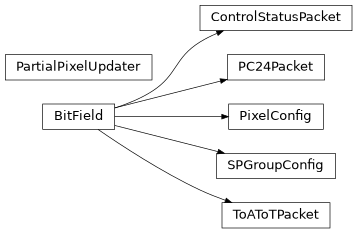spidr4.tpx4tools
spidr4.tpx4tools Module
- class spidr4.tpx4tools.ControlStatusPacket(*vargs, **kwargs)[source]
- data = None
- header = None
- segment = None
- top = None
- class spidr4.tpx4tools.PC24Packet(*vargs, **kwargs)[source]
- EoC = None
- EventCount = None
- Pixel = None
- SPGroup = None
- SPixel = None
- Top = None
- class spidr4.tpx4tools.PartialPixelUpdater(tpx4: Timepix4Stub, initial_cfg: Buffer | _SupportsArray[dtype[Any]] | _NestedSequence[_SupportsArray[dtype[Any]]] | complex | bytes | str | _NestedSequence[complex | bytes | str], idx: int = 0, spgaccess=False)[source]
Convenience class for (partially) updating a pixel matrix.
It works by initially programming the matrix with provided pixel config.
After this you can update the pixel-matrix by calling the update() function, which will only update those columns which are actually changed.
- class spidr4.tpx4tools.PixelConfig(*vargs, **kwargs)[source]
- dac = None
- mask = None
- power_enable = None
- tp_enable = None
- class spidr4.tpx4tools.SPGroupConfig(*vargs, **kwargs)[source]
- bypass_down = None
- bypass_up = None
- digital_pixel_enable = None
- mask_sp_0 = None
- mask_sp_1 = None
- mask_sp_2 = None
- mask_sp_3 = None
- vco_adj0 = None
- vco_adj1 = None
- vco_adj2 = None
- vco_adj3 = None
- class spidr4.tpx4tools.ToAToTPacket(*vargs, **kwargs)[source]
- EoC = None
- Pileup = None
- Pixel = None
- SPGroup = None
- SPixel = None
- ToA = None
- ToT = None
- Top = None
- addr = None
- fToA_fall = None
- fToA_rise = None
- ufToA_start = None
- ufToA_stop = None
- spidr4.tpx4tools.chip2logic_cfg_matrix(configblob)[source]
Converts a pixel configuration as returned by GetConfigPixels to a 2D array (rows x cols).
- Parameters:
configblob – numpy array containing pixel configuration data
- Returns:
A numpy array shape=(512,448), dtype=u8
- matrix_response=tpx4.GetConfigPixels(
rpc.ChipIndex(idx=0)
)
pixelconfig=chip2logic_matrix(matrix_response.config)
print(pixel_config[5,5])
- spidr4.tpx4tools.chip_coords2logic(top, eoc, spgroup, spixel, pixel, is_config=False)[source]
Coords to logic x,y position :param half: Half, 0 - bottom, 1 - top :param eoc: End of column 0..223 :param spgroup: Super pixel group 0..15 :param spixel: Super pixel 0..3 :param pixel: Pixel 0..7 :param is_config: Whether or not the coordinates are for a configuration :return:
- spidr4.tpx4tools.decode_dd_packet(val, pc24=False)[source]
Decodes data-driven mode :param val: :return:
- spidr4.tpx4tools.decode_eoc_mon(reg_value)[source]
Decodes an EoC monitoring column
- Parameters:
reg_value – Reg value
- Returns:
Tuple <DLL code>,<locked status>
- spidr4.tpx4tools.disable_prbs(tpx4)[source]
Disables the PRBS generation :param tpx4: The gRPC service tpx4 stub
- spidr4.tpx4tools.enable_prbs(tpx4, top_channels, bot_channels, mode)[source]
Enable PRBS for the channels you want :param tpx4: The gRPC service tpx4 stub :param top_channels: Bitmask of top channels to enable :param bot_channels: Bitmask of bottom channels to enable :param mode: The mode to select.
- spidr4.tpx4tools.fb8_decode(pkt_gen)[source]
returns the first full frame found while scanning the packet generator.
A packet generator can be created through the use
stream.unwrap_stream(strm).- Parameters:
pkt_gen – An iterator providing 64 bit packets.
- Returns:
a 2D array (segment, pixel data)
- spidr4.tpx4tools.fb_to_image(bottom, top)[source]
Converts frame-based acquisition arrays to an 448x512 pixel image.
Input was was received by fb8_decode or fb16_decode
- Parameters:
bottom – Bottom frame-based segements
top – Top frame-based segments
- Returns:
A pixel array of 512x448 pixels
- spidr4.tpx4tools.logic2chip_cfg_matrix(pixelcfg)[source]
Converts a logical pixel configuration (numpy array shape=(512,448), dtype=u8) to a flat numpy array which can be fed into the tpx4.ConfigPixels() called.
- Parameters:
pixelcfg (ndarray) – Pixel configuration in [rows,column] ordering
Retruns
- ndarray
A flat array which can be fed to rpc.Tpx4PixelConfig()
— pixel_config = np.zeros(shape=(512, 448)) pixel_config[5, 5] = 0xF
config_blob = logic2chip_matrix(pixel_config)
- tpx4.ConfigPixels(
rpc.Tpx4PixelConfig(idx = 0, config=config_blob.tobytes())
)
Functions
|
Converts a pixel configuration as returned by GetConfigPixels to a 2D array (rows x cols). |
|
Coords to logic x,y position :param half: Half, 0 - bottom, 1 - top :param eoc: End of column 0..223 :param spgroup: Super pixel group 0..15 :param spixel: Super pixel 0..3 :param pixel: Pixel 0..7 :param is_config: Whether or not the coordinates are for a configuration :return: |
|
|
|
|
|
Decodes data-driven mode :param val: :return: |
|
Decodes an EoC monitoring column |
|
Disables the PRBS generation :param tpx4: The gRPC service tpx4 stub |
|
Enable PRBS for the channels you want :param tpx4: The gRPC service tpx4 stub :param top_channels: Bitmask of top channels to enable :param bot_channels: Bitmask of bottom channels to enable :param mode: The mode to select. |
|
returns the first full frame found while scanning the packet generator. |
|
Converts frame-based acquisition arrays to an 448x512 pixel image. |
|
Converts a logical pixel configuration (numpy array shape=(512,448), dtype=u8) to a flat numpy array which can be fed into the tpx4.ConfigPixels() called. |
|
x, y to coords |
|
Classes
|
A BitField is an abstraction to get/set bit-fields on a word. |
|
|
|
|
|
|
|
Convenience class for (partially) updating a pixel matrix. |
|
|
|
|
|
Variables
|
Represent a union type |
int([x]) -> integer int(x, base=10) -> integer |
|
int([x]) -> integer int(x, base=10) -> integer |
|
int([x]) -> integer int(x, base=10) -> integer |
|
int([x]) -> integer int(x, base=10) -> integer |
|
int([x]) -> integer int(x, base=10) -> integer |
|
int([x]) -> integer int(x, base=10) -> integer |
|
int([x]) -> integer int(x, base=10) -> integer |
|
int([x]) -> integer int(x, base=10) -> integer |
|
int([x]) -> integer int(x, base=10) -> integer |
|
int([x]) -> integer int(x, base=10) -> integer |
|
int([x]) -> integer int(x, base=10) -> integer |
|
int([x]) -> integer int(x, base=10) -> integer |
|
int([x]) -> integer int(x, base=10) -> integer |
|
|
Optional[X] is equivalent to Union[X, None]. |
int([x]) -> integer int(x, base=10) -> integer |
|
int([x]) -> integer int(x, base=10) -> integer |
|
int([x]) -> integer int(x, base=10) -> integer |
|
int([x]) -> integer int(x, base=10) -> integer |
Class Inheritance Diagram
